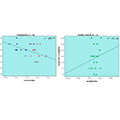Abstract
Introduction This study assessed bias in selective attention to facial emotions in negative symptoms of schizophrenia and its influence on subsequent memory for facial emotions.
Methods Thirty people with schizophrenia who had high and low levels of negative symptoms (n = 15, respectively) and 21 healthy controls completed a visual probe detection task investigating selective attention bias (happy, sad, and angry faces randomly presented for 50, 500, or 1000 ms). A yes/no incidental facial memory task was then completed. Attention bias scores and recognition errors were calculated.
Results Those with high negative symptoms exhibited reduced attention to emotional faces relative to neutral faces; those with low negative symptoms showed the opposite pattern when faces were presented for 500 ms regardless of the valence. Compared to healthy controls, those with high negative symptoms made more errors for happy faces in the memory task. Reduced attention to emotional faces in the probe detection task was significantly associated with less pleasure and motivation and more recognition errors for happy faces in schizophrenia group only.
Conclusions Attention bias away from emotional information relatively early in the attentional process and associated diminished positive memory may relate to pathological mechanisms for negative symptoms.
